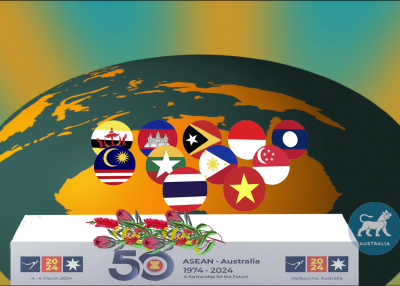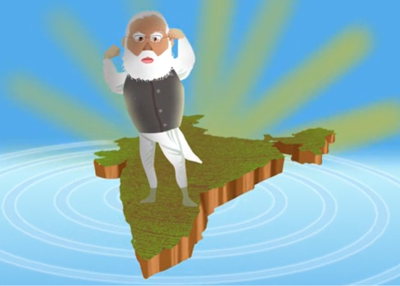Briefing MONTHLY #48 | March 2022
Election guide | India relations | Budget aid boost | Jokowi’s G20 dilemma | Korea election | Japan business
Illustration by Rocco Fazzari.
POLLING DAZE
Asia hasn’t played a significant role in Australian elections since the Vietnam War in the late 1960s. But perceptions about who can best manage more broadly defined “national security” are more often part of the rhetorical campaign battle.
With a federal election set to be called in the coming days amid the Ukraine war and a new challenge from China in the Solomon Islands, these perceptions about national security seem set to play a bigger role than usual. The way Tuesday’s Budget speech highlighted increased spending on defence and cyber security, but not the more modest increased spending on development aid, only underlined how national security can be presented in different ways in a campaign.
In his pre-election foreign policy speech this month Prime Minister Scott Morrison fired the first shots conjuring up a challenging new “arc of autocracy” which he emphasised his government had been preparing for with defence spending, new diplomatic links, and economic resilience measures. Opposition Leader Anthony Albanese replied shortly after presenting himself as fully aligned with Morrison on Ukraine and China while claiming a Labor national security lineage stretching back to Prime Minister John Curtin in 1942. (See: the Asia content of both speeches in ASIAN NATION below)
While opinion polls commonly show that the Liberal-National coalition is seen as better equipped to manage national security, the two current available polls on this issue suggest a more diffused environment may now exist.
A recent Guardian Essential poll suggests the majority of voters see China and the bilateral relationship as a complex issue to be managed rather than a threat to be confronted, and more voters trust Labor than the Coalition to manage that complexity. The poll shows 61 per cent of people see the relationship as complex, and only 26 per cent see it as a threat to be confronted.
But a Newspoll at about the same time found that 74 per cent of people thought China was a threat and 18 per cent thought it was not a threat. Thirty-three per cent of respondents thought the Coalition was best to handle a China threat compared with 26 per cent for Labor, with 21 per cent saying they would be equally competent.
Both Morrison and Albanese sought to paint each other as “the Manchurian (pro-China) candidate” in February in a significant departure from the idea that the two major parties take a largely bipartisan approach to foreign policy. (See: February’s Briefing MONTHLY for the Manchurian candidate debate).
But this election is being held amid potentially contradictory new developments on China domestically. The long running Australian Electoral Study and more recent Lowy Institute polling show a big increase in the proportion of people who see China as a threat. But at the same time ethnic Chinese voters are more important in some key individual electorates and they may have quite varied attitudes to the security debate. These include relatively close seats such as Chisholm, Bruce and Menzies (in Melbourne) and Reid, Bennelong and Banks (in Sydney) (See: CHINA: PARTY TICKET below for the China policy differences and this ABC story for an insight into the thinking of the ethnic Chinese diaspora).
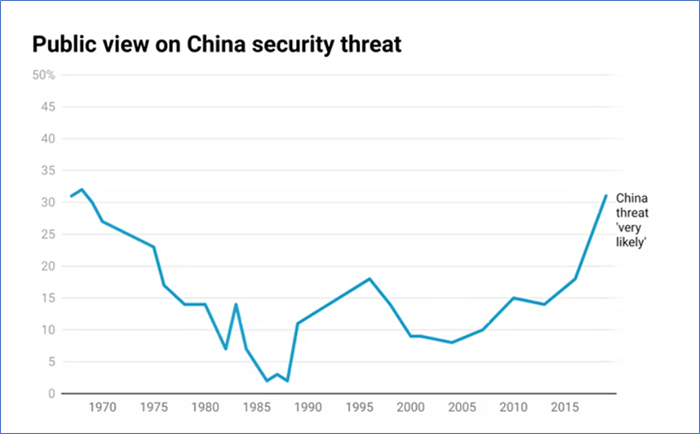
Source: Australian Electoral Study/Ian McAllister
While Labor is shadowing the government on broader national security issues in an attempt to focus the election on domestic issues and avoided being wedged as “weak” on security, it has made some specific Asia policy attacks where it appears to think it can win votes.
It has argued Morrison’s signature Pacific Step-up has not delivered due to the government’s lack of attention to climate change. It has similarly argued the government has not delivered on the promise of the 2018 India Economic Strategy, which may appeal to the growing Indian diaspora in Australia (See ELEVATING INDIA below).
And Labor has flagged, but not specifically promised in the election context, higher development aid spending. The government notably addressed each of these Labor attack lines in Tuesday’s Budget. (See: BUDGETTING TO AID below and the Development Policy Centre on the political aid battle here and the Budget here.)
Wrapping up this brief outlook on the imminent election campaign, we also look at two other related developments in this month’s edition.
DIPLOMATICALLY SPEAKING has the key quotes for a largely unreported policy reversal by Morrison on using the term “Build Back Better” for recovery spending from the bushfires and pandemic as he attempts to portray Albanese as a supporter of high spending public sector-led recovery measures. That is despite the way the Joe Biden and Boris Johnson governments and the Group of Seven countries use this term for the recovery measures. The issue is fully examined here and here.
In NO DEFENCE FOR UNIS below, the director-general of the Office of National Intelligence Andrew Shearer has given universities a tough public warning on Chinese interference despite Group of Eight pushback against the government’s international student diversification policy. The universities traditionally have a better relationship with Labor and may hope for a better hearing under a new government, although it is unlikely the intelligence assessment would change.
Finally, it’s also election season in Asia, with India’s dominant Bharatiya Janata Party getting a big boost in the world’s most populous state Uttar Pradesh and a nail-biting finish in South Korea’s presidential race. See NEIGHBOURHOOD WATCH, down further this month to accommodate the election focus.
ASIAN NATION
ELEVATING INDIA
The Morrison Government has recommitted to the idea that India will be a top three export market and investment destination for Australian business by 2035 in a new package of measures to boost bilateral economic cooperation.
On March 22, Trade Minister Dan Tehan announced plans to spend $280 million presumably over five years in an update to the India Economic Strategy to 2035. This appears to be separate to the $245 million over five years detailed in Tuesday’s Budget related to last year’s Comprehensive Strategic Partnership with India. This money was accounted for, but not revealed, in last December’s Mid-Year Economic and Financial Outlook with only $26 million detailed, mainly for a Bengaluru consulate. But some is coming from existing Defence funds and so the extra money appears to be about $142 million. The programs were partly detailed in this February 14 announcement but not fully costed. Nevertheless, all up, this is a significant new round of spending on India relations. An interesting inclusion is funding for a Maldives embassy.
The measures have been announced as the decade old push for a bilateral trade agreement with India appears to have again fallen short of conclusion targets set by special trade envoy Tony Abbott of before Christmas and by Tehan for last week.
The new economic initiatives include $16.6 million to strengthen linkages with India’s key policy and finance institutions and $8.9 million to support enhanced business engagement and an increased Austrade presence in India.
In an online meeting between Prime Ministers Scott Morrison and Narendra Modi, Australia also committed $17 million to extend the Australia-India Strategic Research Fund; $36 million for a Green Steel Partnership, a Critical Minerals Research Partnership, and a contribution to the International Energy Agency for clean energy; $25 million to expand the Australian Space Agency’s cooperation; and $28 million to launch a Centre for Australia-India Relations to deepen community ties.
Tehan said the government remained committed to the ambitions in the 2018 India Economic Strategy just as the Labor Opposition has notably started to target lack of progress on the strategy as a failure of foreign policy.
He said: “The Update represents a five-year action plan that responds to the evolving opportunities for both countries, building on Australia’s traditional strengths and forging new partnerships in emerging areas of cooperation such as critical minerals; cyber and critical technology; science and innovation.”
In a third arm to the latest pre-election boost to engagement, acting Education Minister Stuart Robert announced that Australia and India would establish a taskforce to advance mutual recognition of qualifications although there were few details on how this would occur.
And rounding out the renewed India focus, a new report Australia’s Indian Diaspora: A National Asset highlights how this community is the fastest growing large diaspora and the Indian-born population could reach 1.07 million by 2035.
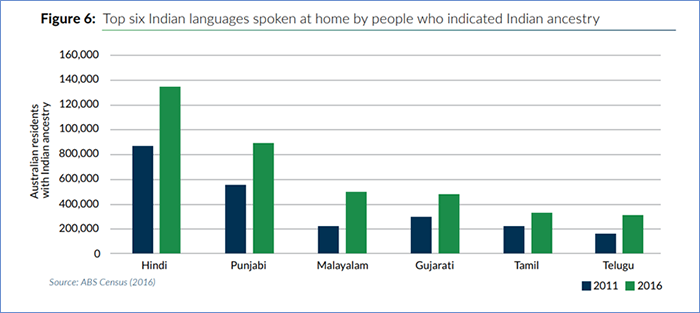
Source: Australia’s Indian Diaspora
BUDGETTING TO AID
Tuesday’s Federal Budget was all about household assistance before the election, although the defence and cyber security spending underline how national security will be a constant election campaign theme.
But in other Asia-related measures in development aid, the government has restored inflation indexing to aid spending for the first time since it came to power and once again provided a “temporary” increase for the third year in a row to deal with the impact of the pandemic in the region.
The bottom next financial year will be $1.85 billion plus about $340 million temporary aid for the Pacific; $1.15 billion plus $114 million temporary spending for Southeast Asia; $305 million for south and west Asia (not including the India boost above); and $1.16 billion for other countries and global programs.
The Pacific special spending includes support for aviation, food security and extension of the Pacific Australia TV service. A new High Commission in Honiara costing $65 million has also been confirmed just as new tensions are breaking out with the Solomon Islands government over China.
The special spending in Southeast Asia is described as economic, development and security measures which sounds like alignment with various previously announced measures in the de facto “step back” to this region over the past two years after significant aid cutting earlier.
This increase in aid this year is unlikely to stop Australia’s slide down the list of global aid donors to the point where it contributes only 0.2 per cent of GDP to aid compared with a global benchmark target of 0.7 per cent.
However, in another sign of how aid priorities are changing, the more notable Budget change was a doubling of the lending capability of the Australian Infrastructure Financing Facility for the Pacific (AIFFP) from $1.5 billion to $3 billion, plus the pre-existing $500 million grant money.
While less than $100 million of this program originally announced in 2018 has been drawn down so far, the capacity increase has paved the way for more big strategically significant infrastructure projects such as the support for Telstra’s purchase of Digicel Pacific.
LABOR’S ASIA
Opposition leader Anthony Albanese has declared Indonesia and India to be priorities as he has sought to track the federal government’s position on China even more closely in the wake of the Ukraine invasion.
Speaking at the Lowy Institute, just days after Prime Minister Scott Morrison, he sought to claim relations with the Association of Southeast Asian Nations (ASEAN) as a Labor strength by saying he would elevate engagement with Southeast Asia “building on our legacy as the Party that secured Australia as ASEAN’s first dialogue partner in 1974.)
A Labor government would work with Indonesia to Jakarta to deliver a $200 million climate and infrastructure partnership and deliver on the opportunities from the Indonesia Australia Comprehensive Economic Partnership Agreement that have “not yet been delivered.”
He said China had failed in its responsibilities as a permanent member of the UN Security Council over the Russian invasion of Ukraine and the “China of Xi Jinping has demonstrated a harsher authoritarianism and more strident nationalism”.
In an insight into the likely tone for the forthcoming election campaign, he said: “The search for false distinctions between the Government and Opposition on China is not in Australia’s national interest, as both current and former leaders of our security and intelligence agencies as stated so clearly. We have the same position on the South China Sea, Taiwan, Hong Kong and human rights abuses against Uighurs and Tibetans. I was a member of the Gillard Government that brought US Marines to Darwin. And as Shadow Infrastructure Minister I opposed the sale of the Port of Darwin.”
MORRISON’S ASIA
With the Ukraine war putting broadly defined national security at the top of his international relations agenda, Prime Minister Scott Morrison’s Lowy Institute speech contained little new detail about specific relations with Asian countries.
But like Albanese, he elevated relations with Southeast Asia to the top of his regional hierarchy saying the recent Comprehensive Strategic Partnership with the Association of Southeast Asian Nations demonstrated “the primacy of our engagement with Southeast Asia” whose security and growth was “fundamental” to Australia’s.
This was striking because has tended to give relations with the South Pacific “family” his top rhetorical ranking, but he nonetheless said the futures of Australia and Pacific island nations were “inextricably linked”. And despite the breakdown in relations with France, he asserted that Australia was working with European partners to support their Indo-Pacific strategies.
Not surprisingly, he devoted the most time to China declaring that the Ukraine war meant the time had come for China to show that its commitments to global peace and respect for sovereignty and territorial integrity “are more than just words”.
NO DEFENCE FOR UNIS
Australia’s top security official has given universities a blunt public warning that they will have to draw clear boundaries around any research which can be used by the Chinese military.
Director-general of the Office of National Intelligence Andrew Shearer used an unusual appearance at The Australian Financial Review Business Summit to declare that while academic exchanges were valuable: “The old dividing line between defence technologies and civilian technologies is increasingly blurred
“And we’re going to have to be mindful of that … I think most of us will increasingly agree that a situation where Australian research is finding its way into capabilities to provide the PLA (China’s People’s Liberation Army), or other advanced militaries, with extremely damaging and dangerous capabilities is not an acceptable form of academic interchange.”
“And that’s why the taskforce that works between the Commonwealth authorities and the higher education sector has an important role to play and we just have to keep up this two-way exchange.”
Shearer observed that only a couple of years ago it would have been unusual for him to appear at such a business summit but by doing so he was underlining that the government needed to be “better joined up” with business and other institutions such as universities.
Shearer’s comments came just days after the Group of Eight universities pushed back against the government’s international student diversification policy which implies that some universities will have to reduce dependence on students from China and India.
Shearer said he understood the importance of foreign students to the economic viability of universities and to the broader Australian society, but a clear line had to be drawn around technology exchanges.
However, the dilemma for both the government and the universities in rebuilding relations with China was underlined at the same Summit when the only Chinese speaker – economist Keyu Jin – specifically identified “knowledge exchange and university exchange” as the main way forward in bilateral relations.
CHINA: PARTY TICKET
A survey of policy approaches to China by the Morrison government and the Labor Opposition shows that there is much more agreement than the pre-election debate might suggest.
It says that while there is divergence between the major parties on how policy should be pursued, with the ALP stressing the need for a greater emphasis on diplomatic tone and conduct, this does not extend to policy substance.
The Australia-China Relations Institute survey points out that the main tension over China is actually coming from individuals on both sides who want an even tougher line on China than the largely concurring official party positions.
It says: “The Coalition-ALP China consensus has, in recent years, led to policy convergence on the need to push back against Beijing whenever its actions are bullying or coercive. This convergence, however, has resulted in policy stasis, one which, given the fluidity and unpredictability of current circumstances, any future government will need to confront and perhaps move beyond.”
NEIGHBOURHOOD WATCH
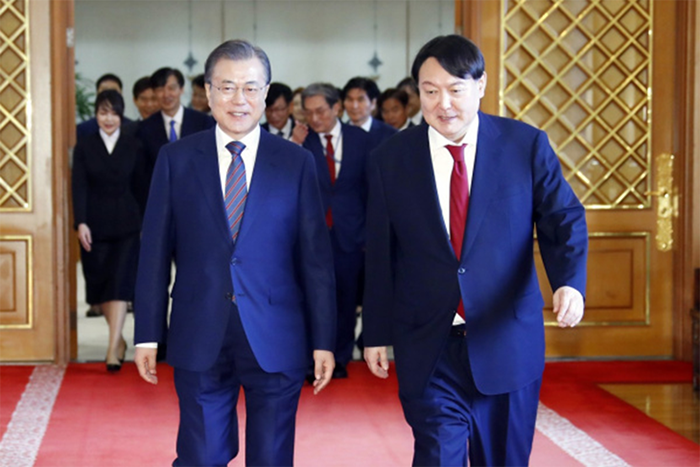
Moon Jae-in (left) and his replacement Yoon Suk-yeol in happier times.
SEOUL SURVIVOR
South Korea’s new president Yoon Suk-yeol has not let the country’s narrowest ever election victory stop him from making waves in a system where the opposition party will still control the National Assembly for at least another two years.
Yoon, from the conservative People Power Party, beat the left-wing Democratic Party candidate Lee Jae-myung by only 0.73 percentage points. But he has since been involved in tensions with the Administration of outgoing Democratic President Moon Jae-in, underlining how divided the political environment may be.
Yoon has said he wants to move out of the Blue House, the traditional residence of the President, so he can be closer to the people, despite significant public opposition due to the cost. Meanwhile, Moon has appointed a new central bank governor sparking a row about how much he consulted the Yoon team. The outgoing and incoming leaders only met on Monday to discuss handover arrangements after an unusually long delay following an election result.
With the last two conservative presidents serving jail terms for corruption, there is much speculation about whether Yoon, a high-profile former prosecutor, will initiate investigations into Lee or Moon to undermine the Democratic control of the Assembly.
Yoon has promised to build stronger western alliance links with the United States and Japan and take a tougher approach to North Korea. But his authority after being sworn in on May 10 will be quickly tested by regional government elections in June ahead of the Assembly elections which are not due until 2024.
- Yoon’s narrow victory may be a setback for his country’s attempt to join the Comprehensive and Progressive Agreement for Trans-Pacific Partnership trade deal, according to Jin Kyo-suh, from the Korea Institute for International Economic Policy at East Asia Forum.
MODI’S MEGA PARTY
While two of the world’s most bruising political machines in Russia and China have run up against unexpected limits on their power in Ukraine this month, another has more quietly been flexing its muscles.
The sweeping election victory for the Bharatiya Janata Party (BJP) in India’s biggest state Uttar Pradesh has underlined how Prime Minister Narendra Modi has built the world’s biggest political party in the world’s biggest democracy despite a series of policy snafus during his seven years in power. The BJP claims 100 million registered members.
And the collapse of the once similarly dominant Congress Party in the parallel state election in Punjab has underlined how while political opposition is still alive in India, it is hard to frame up a national alternative to the BJP.
The BJP lost some ground in Uttar Pradesh but still rules in the Hindu heartland state of 200 million people where it barely existed a decade ago in a sign Modi has recovered from the pandemic and is on track to win the 2024 national elections.
The success of the New Delhi-based Aam Aadmi (Common Man) Party in Punjab at the expense of Congress has raised some hopes this still relatively new party could become the basis of a new coalition to challenge the BJP.
Indian election watcher Ruchir Sharma writes in the Financial Times that Modi’s humble origin and uncorruptible image has allowed him to stand out from India’s political establishment.
JOKOJAYA RISING
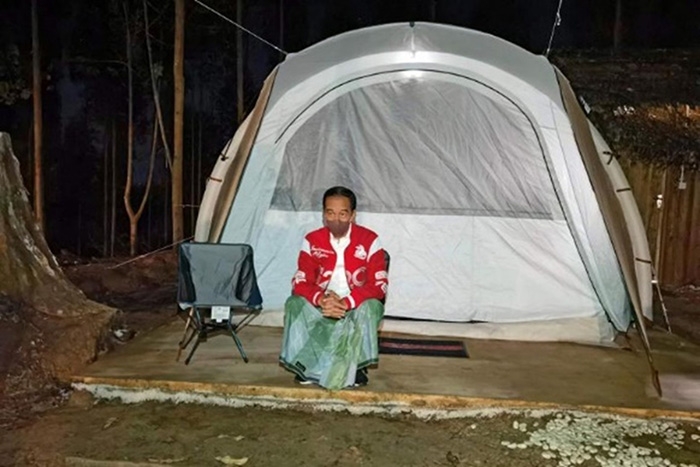
Ground floor ... Joko Widodo at the planned new capital. Picture: Presidential office
Indonesia’s President Joko Widodo is pushing ahead with his ambitious plan to build a new capital city to replace Jakarta in East Kalimantan amid renewed speculation he wants to extend his term in office.
In early March he camped out on the construction site for the proposed $50 billion city to be called Nusantara after swearing in the new head of the construction authority and holding a meeting of regional governors at the location.
But the visit has only added to speculation that Widodo is once again eyeing an extension of his presidential term to ensure the new city gets built, with several political figures backing some form of change to his scheduled departure from office in 2024.
The options range from removing the two-term limit for the presidency which was instituted as part of Indonesia’s democracy reforms two decades ago to some form of short-term extension help the country recover from the pandemic. Other elected politicians could benefit from a temporary term extension.
One of the country’s most influential ministers Luhut Panjaitan has claimed the public supports a limited term extension to recover from the pandemic although opinion polls don’t support this claim.
- Endy Bayuni argues in The Jakarta Post that the term extension campaign is “a sure recipe for the end of democracy and a return to authoritarianism”. And see G19 OR BUST.
CHINA’S SLOW LANE
A new study of China’s economic growth has suggested that it will never establish a meaningful lead over the United States even if it does manage to overtake it by the middle of the century.
The Lowy Institute analysis says that contrary to more optimistic outlooks, China faces a substantial long-term growth deceleration due to the legacy effects of its uniquely draconian past population policies, reliance on investment-driven growth, and slowing productivity growth.
It says: “Expectations regarding the rise of China should be substantially revised down compared to most existing economic studies and especially the expectations of those assessing the broader implications of China’s rise for global politics.”
Contrary to estimates that China could grow 4-5 per cent a year to 2050, the analysis says 2-3 per cent is more realistic and would result in a “very different” future.
DEALS AND DOLLARS
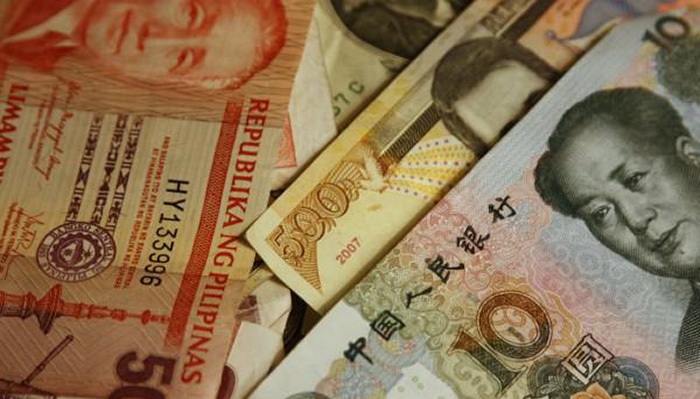
JAPAN INVESTMENT
Merger and acquisition activity between Japanese and Australian companies remained muted last year despite high levels of global investment by Japanese companies and record merger activity in Australia.
The latest bilateral investment report from Herbert Smith Freehills notes the bilateral M&A activity was lower than expected given the rising levels of activity before COVID hit in 2020. The report identifies 27 acquisitions and six divestments with a total value of $1.3 billion for the ones that were disclosed. But TAL’s purchase of Westpac’s life insurance business for $900 million accounted for most of that.
Nevertheless, the report says: “Relationships were not diminished by the challenges of COVID-19, and established companies will continue to invest as new opportunities arise. New entrants are likely to return once the impediments to movement are removed to build on the 2017 to 2019 trend when approximately half the acquisitions were by new entrants to Australia.”
And it highlights that new energy partnerships will be crucial to maintaining Australia’s role as the main energy supplier to Japan in the run up to the mid-century target for net zero carbon emissions.
New partnerships ranging from hydrogen production and transport to battery materials doubled in 2021 with 25 agreements taking the total so far to 40 with more Japanese and Australian entities working together at a project level than ever before.
“These partnerships are a distinct third paradigm in the Japan-Australia business relationship which started (firstly) with joint ventures in minerals, energy and food in the 1960s and evolved with (secondly) numerous 100% or majority acquisitions of a variety of domestic businesses from 2007,” the report says.
HOSPITAL PASS
Australia’s largest private hospital operator Ramsay Health Care may be on the verge of exiting the largest Australian health business in Asia with a buyout offer for its Malaysian-based business.
Malaysian-based IHH Healthcare Berhad, which operates in ten countries, has made a non-binding offer to buy Ramsay Syme Darby Health Care for about $1.8 billion.
The sale of the joint venture with Malaysia’s Sime Darby Holdings would likely end Ramsay’s 18-year-old effort to build a regional healthcare business which began with the purchase of Indonesian hospitals in 2005. That investment made Ramsay founder Paul Ramsay, who died in 2014, a key figure in the Australia-Indonesia business scene.
The Indonesian hospitals were subsequently absorbed into the Malaysian joint venture and there had been speculation the joint venture would be floated to fund a broader push into regional healthcare.
STOKES SEEKS CHINA SHIFT
Seven Group chief executive Ryan Stokes has reiterated his family’s long-standing support for China business ties despite the decline in the bilateral relationship.
Stokes said in an interview with The Australian that the COVID shutdowns had particularly undermined business contact with China because “China is not really a country you can build rapport with via Zoom. So, I think in that context (with COVID-19) we haven’t had the business meetings and the nuancing of our message across multiple aspects. That’s probably played into elevated tension.”
“Hopefully, we can get a bit more breadth in our engagement with China, because that’s going to be an important part of our future, in any way that plays out. The trade outlook with China should be strong and we’d like to think that any issues that are emerging can be dealt with an enhanced, constructive dialogue.”
Stokes’ father, Kerry, built strong business relationships in China through the ownership of the Caterpillar machinery franchise in the country for more than a decade but sold out to a Chinese company in 2017 as the downturn in relations was just beginning.
POWERING SINGAPORE
Billionaires Mike Cannon-Brookes and Andrew Forrest have increased their investment in Sun Cable’s planned $30 billion solar power export project to Singapore, by leading a $210 million capital raising.
The increased support from the founder owners of Atlassian and Fortescue Metals Group raises their stake in the ambitious project to export solar power from the Australian outback to Singapore.
The project aims to start supplying clean power to Singapore in 2027 but may now receive more attention due to the heightened concerns around energy security as a result of the war in Ukraine.
WINE FOR CHINA
The McGuigan Wines brand is expanding from its Australian base for the first time with a new range of red wines made in Chile and shipped to China.
Parent company Australian Vintage came up with the plan after China imposed tariffs on Australian-made wines which virtually ended the $1.3 billion export market into China. Chief executive Craig Garvin told The Australian Financial Review the new label called McGuigan Wines of the World also had the capacity to expand to being sourced from other countries as the group sought to make it a truly global brand.
Australian Vintage, which operates McGuigan, Tempus Two and Nepenthe as its main brands, previously had a small presence in China, which represented about five per cent of its total exports.
The McGuigan venture parallels attempts by Treasury Wine Estates to keep a long-term foothold in the China market by sourcing Treasury branded product from other countries including the United States.
GREENING ASIA
Private plantation land manager New Forests will nearly double its sustainable forestry plantations in south-east Asia after it secured US$120 million ($164.6 million) in new capital for its latest fund.
While Asia has the world’s fastest-growing demand for wood products, it has seen development of sustainable plantations curtailed by a lack of investment. New Forests – a global manager of nature-based real assets and natural capital strategies – said it had secured almost $165 million of sovereign wealth, corporate, philanthropic and development finance capital from Australia, Europe, Japan, the Philippines, Singapore and the United States.
The Tropical Asia Forest Fund 2 will use the money to establish a portfolio of sustainable forest plantation assets in Malaysia, Indonesia, Vietnam, Thailand, Laos and Cambodia for users of timber, rubber and carbon.
NEW DAIGOUS
Goat infant formula maker Bubs Australia has signed a new equity share deal with its biggest corporate daigou partner, Hong Kong-based Willis Trading, in exchange for minimum purchases of its products that is aimed at expanding its Chinese consumer base.
Bubs’ top daigou distributor remains AZ Global in Australia. But the equity linked deal is directly with Willis Trading, which has been Bubs’ largest customer since 2020. Willis Trading is a wholly owned subsidiary of Hong Kong-listed Alpha Professional Holdings and is a distribution partner that works closely with AZ Global.
The deal follows the collapse of the daigou channel – in which customers in China pay a fee for products – due to border closures, forcing Australian exporters to write off inventories and rethink their China strategies. The daigou system has evolved from a fragmented network of international students and tourists taking products back to China in suitcases to become a more structured export channel for popular baby formula and health products.
DIPLOMATICALLY SPEAKING
This is about helping communities build back better. As our communities battle to overcome the effects of drought, bushfires and now COVID-19, it’s initiatives like these that will also help accelerate economic recovery.
- Scott Morrison (June 23, 2020)
The biggest weapon in our arsenal is the Build Back Better Act. Nothing is going to do more to ease pressure on families.
- Joe Biden (January 21, 2022)
We must grasp the historic opportunity before us: to learn the lessons of this awful pandemic and build back better, levelling up across our United Kingdom and fixing the problems that have held back too many people for too long.
- Boris Johnson (March 3, 2022)
I’ve never really been in the build back better camp. Our model of economic management and business-led economic growth has been world-class, it doesn’t need to be replaced by some government-centred reimagination of global capitalism. Give me business-led growth every time.
- Scott Morrison (March 8, 2022)
DATAWATCH
PAYING UP
Australia’s largest taxpaying migrant groups
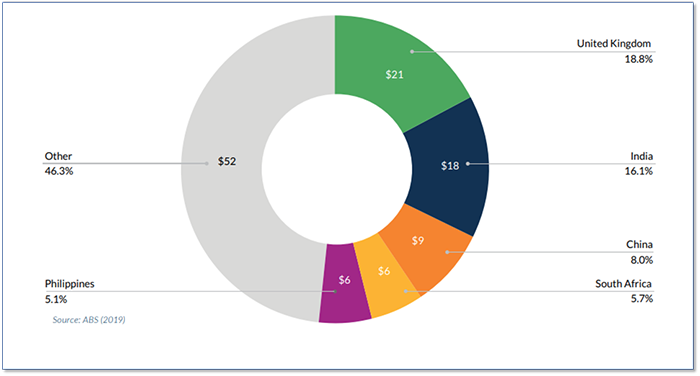
Source: ATO/Australia’s Indian Diaspora report
ON THE HORIZON
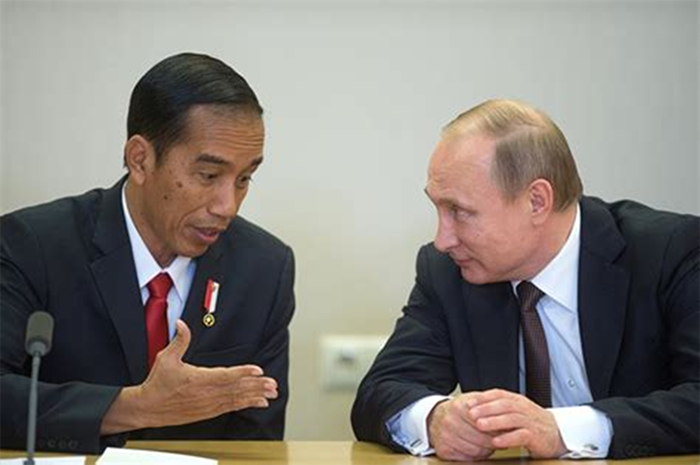
Joko Widodo and Vladimir Putin during a 2016 Russia-ASEAN summit. Picture: Russia-asean20.ru
G19 OR BUST?
Indonesia’s leadership of the Group of 20 major economies for this year faces its first formal showdown over Russia’s inclusion in late April when a meeting of finance and central bank officials had been scheduled in Washington.
The finance minister stream last met in Jakarta on February 15 when Treasurer Josh Frydenberg travelled to Jakarta to underline Australia’s commitment to helping Indonesia with its year at the group’s helm.
While any Leaders’ Summit appearance by Russian president Vladimir Putin won’t occur until October in Bali, the looming finance officials meeting prompted warnings from several countries, including Australia, that Indonesia should exclude Russia from attendance.
In a rare public difference with Indonesia, Prime Minister Scott Morrison said Putin’s attendance would be a “step too far” because “I think we need to have people in the room that aren't invading other countries.”
The G20 has never faced a choice over excluding one of its member countries, unlike its partial predecessor the Group of Eight rich countries which shrunk back to the older G7 format by excluding Russia after it seized Crimea in 2014. With G20 members China, India and South Africa abstaining in the United Nations votes on Russia’s invasion and Turkey hosting peace talks, there is unlikely to be a consensus on expelling Russia from the G20. That would risk Indonesia’s Summit being upset by a boycott by some members and pose a difficult decision for Australia.
Kompas newspaper reported on March 20 that Indonesia planned to invite all members to the April 20 finance ministers meeting with G20 co-sherpa Edi Prio Pambudi saying: “No one will be excluded. It is hoped that everyone will be in attendance. If Russia attends, it is hoped that everyone else will attend too.”
Indonesian President Joko Widodo emphasises economic development in his approach to foreign policy while his diplomats emphasise traditional non-alignment. Combined these two approaches appear to be driving Indonesia’s assertion that Russia should still be able to join a multilateral group with an economic remit.
ABOUT BRIEFING MONTHLY
Briefing MONTHLY is a public update with news and original analysis on Asia and Australia-Asia relations. As Australia debates its future in Asia, and the Australian media footprint in Asia continues to shrink, it is an opportune time to offer Australians at the forefront of Australia’s engagement with Asia a professionally edited, succinct and authoritative curation of the most relevant content on Asia and Australia-Asia relations. Focused on business, geopolitics, education and culture, Briefing MONTHLY is distinctly Australian and internationalist, highlighting trends, deals, visits, stories and events in our region that matter.
We are grateful to the Judith Neilson Institute for Journalism and Ideas for its support of Briefing MONTHLY and its editorial team.
Partner with us to help Briefing MONTHLY grow. For more information please contact [email protected]

This initiative is supported by the Judith Neilson Institute for Journalism and Ideas.


